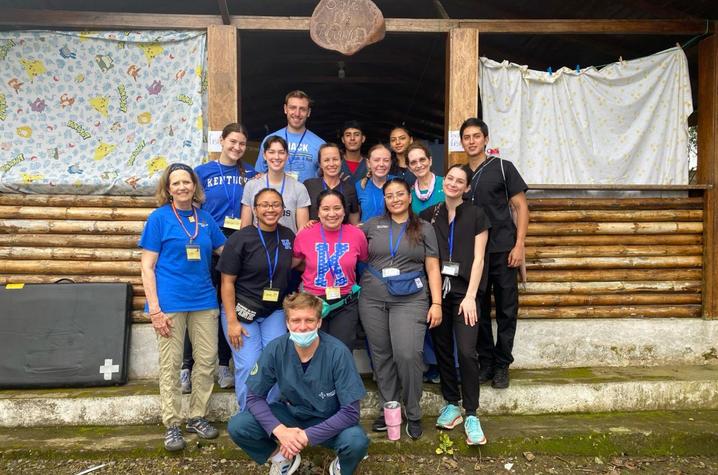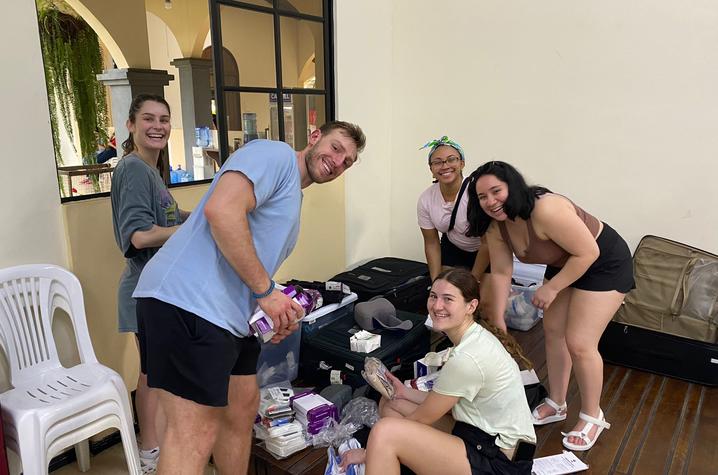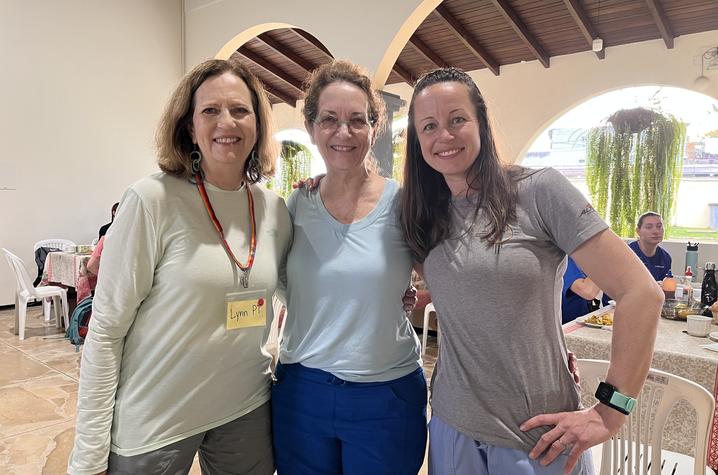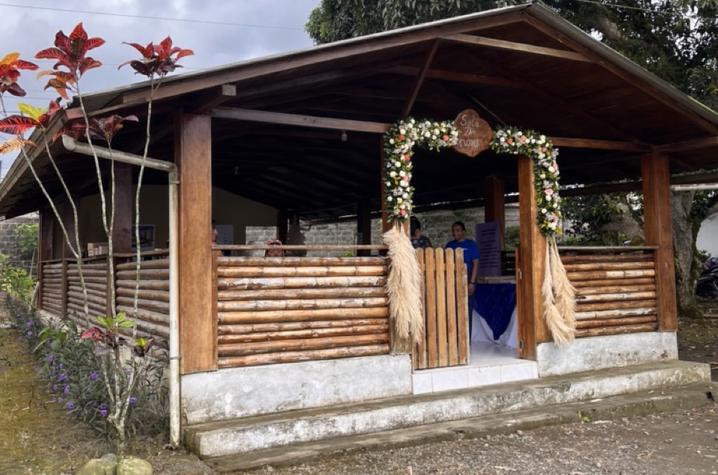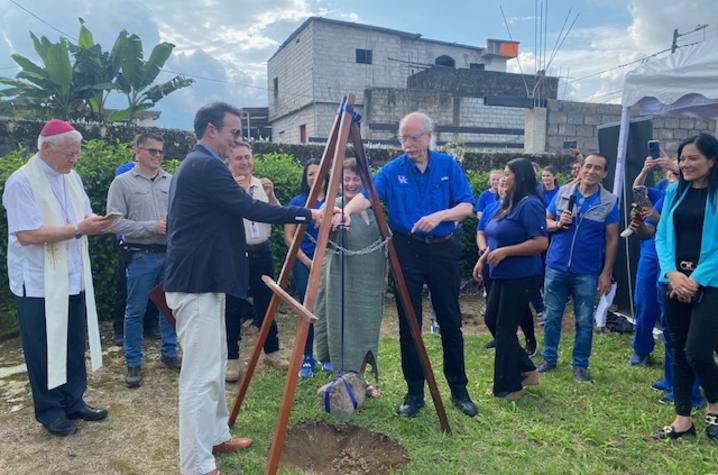Physical therapy students gain hands-on experience through Shoulder to Shoulder Ecuador
LEXINGTON, Ky. (Sept. 5, 2024) – One of the most valuable ways University of Kentucky students can spend their time is by getting real-life, hands-on experience in their field of study.
Since 2008, physical therapy students in the College of Health Sciences (CHS) have had the opportunity to travel to Ecuador, taking their knowledge from the classroom to the clinic. The CHS physical therapy program participation was initiated by professor emeritus Lynn English, D.P.T., founder of the physical therapy teams for Shoulder to Shoulder.
It all started with Tom Young, M.D., professor of pediatrics in the UK College of Medicine. Back in 2002, he decided to look for service learning opportunities abroad. He began taking pediatric residents to Ecuador, where the university already established a connection through a program called Ecuador Partners. While there, he realized there was a town outside of the Santo Domingo area that was poverty-stricken.
Young had a vision for establishing a clinic that would help eliminate some of the barriers to care. He knew it would be important to not only include primary care medicine, but also physical therapy, pharmacy, nursing and all the interprofessional teams it takes to educate populations about health and create a healthier state as a whole.
With his vision, Shoulder to Shoulder Global Ecuador began. Now multiple times each year, students across different academic programs at UK participate and travel to Ecuador to get hands-on experience.
Most people think of the need for medical doctors and nurses when it comes to medical mission work. But, for this community in Ecuador, there is also a big need for physical therapists. Ellen Stockhausen, D.P.T., adjunct assistant professor, and Elizabeth Siereveld, D.P.T., adjunct assistant professor, are program co-coordinators for the program.
“It's their livelihoods – the people in these communities are hardworking and their daily routines involve so much heavy, physical manual labor,” said Stockhausen. “They don't have the same modern household appliances or machinery that we have here in the U.S.”
In these communities, men are often working in the fields and using machetes or lifting heavy loads, and the women take care of multiple children, cook, clean and do laundry – all manually.
“There are so many overuse injuries,” said Stockhausen. “The lack of modern-day conveniences is just astounding and something we take for granted here in the U.S. If you don't have your physical health, then you're doing daily routines with a lot of pain or with a lot of difficulty.”
It’s not only wear-and-tear injuries. The group also discovered that a lot of people are living in their homes with lasting effects of neurological conditions like strokes, brain injuries, spinal cord injuries and other conditions without having the equipment needed to assist them with everyday living.
“To paint a picture of what that looks like, when I was a student on a brigade with Dr. Lynn English in March 2010, we went into the home of some adults who had cerebral palsy and had grown up without positioning equipment,” said Stockhausen. “So, they were lying on mattresses with severe contractures. Their family members would pick them up by their limbs to move them from one place to the next because they didn't have positioning equipment, like a wheelchair, to sit in.”
For many here in the U.S., it's easy to take for granted access to equipment as simple as a wheelchair. But for patients in Ecuador, it can be challenging to receive proper equipment to help them move around in an upright position, eat and communicate.
“We also worked with a woman who was brought into the clinic by two family members who were carrying her on a plywood board covered with sheets,” said Stockhausen. “The next time we saw her, we were able to take a wheelchair for her. This improves her ability to participate in life and provides more ease to the family caring for her.”
This is why physical therapy becomes a huge need for the patients in this community.
“It’s about decreasing pain and improving a patient’s participation. If you're in pain or not able to move well, it decreases your interest in participating in life,” said English.
Students in the CHS physical therapy program have the opportunity to travel to the clinic and serve this population in Ecuador three times each year.
“I really enjoy working with our students,” said English. “Watching them learning and applying their skills in real life, and seeing them light up as they help someone is an incredible experience.”
Each brigade begins with an interprofessional class and physical therapy orientation. Then the students travel to Ecuador to begin their work, putting their skills from the classroom to use.
“This experience is truly life-changing and provides us with the opportunity to strengthen our clinical skills while positively impacting many patients’ lives,” said Isabel Fairbanks, a CHS student who was part of the May 2024 brigade. “What I did not realize is how much of an impact this trip would have on me. Embarking on this trip was very helpful for my clinical reasoning skills and flexibility but was also beneficial in forming everlasting relationships and experiences that I will cherish forever.”
A typical day for the physical therapy students and CHS faculty supervisors starts early. The team travels to their work site and sets up their station, then the clinic opens and they begin seeing patients who need their care. The hands-on experience of this program allows students to practice examination, evaluation and intervention skills using the tests they’re learning in the U.S. classroom.
At the end of each day, they have time for reflection and recap the day with an interprofessional group.
“During our reflection times, after treating, I was able to solidify my ‘why’ for choosing physical therapy,” said Cody Scales, CHS student with the May 2024 brigade. “Being able to experience the different cultures and populations in the different communities and having the opportunity to treat them was something that I will never forget. Seeing how grateful people were for our services, watching people’s faces light up when they left in less pain than when they arrived, and seeing how grateful families were when we were able to provide them with medical equipment that they desperately needed was one of the most rewarding experiences.”
During the brigades, CHS faculty work alongside the students the entire time, making it a low-pressure situation for them to try their skills and problem-solve.
“This opportunity comes at a good time for students in their curriculum because they are eager to get out of the classroom and gain real experience with patients and see how their treatment helps people,” said English.
English has been going on Shoulder to Shoulder trips yearly since its beginning in 2008. Over the years she has grown a strong relationship with the community and clinic they serve.
“It feels like going back to see friends and family when I visit the clinic,” said English. “That’s one really wonderful thing and seeing that the clinic has come so far in its ability to serve the community in so many ways, not just because of what we’ve done, but because of the committed Ecuadorian staff who have learned so much.”
For Stockhausen, Shoulder to Shoulder was one of the reasons why she decided to attend the CHS physical therapy program more than 10 years ago. Now, being a co-coordinator is one of her favorite jobs.
“The trip is the best week of the year,” said Stockhausen. “It gives me so much excitement and inspiration. We become physical therapists because we want to help, and we want to improve people’s lives and make a difference. So, seeing the students succeed and seeing patients feel better by the end of the session gives me a lot of professional satisfaction.”
The work of Shoulder to Shoulder and the clinic in Ecuador received major recognition with the award of a USAID grant for the expansion of the clinic in Ecuador.
This year during the 2024 March Brigade, the clinic broke ground on the expansion project supported by the $420,000 grant. The expansion will allow the clinic to build a rehab facility along with other updates to the clinic. The addition of a rehab facility will allow space for physical therapists to practice year-round and increase access to physical therapy for the community.
CHS plans to continue growing its representation in the Shoulder to Shoulder program. This year, more students will be participating in the program and representing the Department of Physical Therapy than ever before. The CHS physical therapy students have all shown an intense desire to participate in service learning opportunities, and they are willing to go out of their way to do so.
This growth wouldn’t be possible without the support of Scott Lephart, Ph.D., dean of the College of Health Sciences, and Patrick Pabian, Ph.D., chair of the Department of Physical Therapy.
“The Shoulder to Shoulder program has proven to have a much-needed impact on the community being served, while also having a long-lasting effect on the students we send,” said Pabian. “Through this immersion, students experience personal and professional growth that cannot be obtained in a typical classroom environment. We know that students will use these experiences in their development as patient-centered health care providers. We are exceptionally thankful to Dr. English for her long-term dedication and vision in developing this important program, and both Dr. Stockhausen and Dr. Siereveld for leading the charge and being such a positive mentor to the UK students.
Dean Lephart and Dr. Pabian have helped by supporting the initiative financially which has allowed the program to expand its reach and ability to recruit people genuinely committed to service to the underserved.
“In the College of Health Sciences, our mission is to help people achieve the highest level of health that they possibly can,” said Dean Lephart. “Supporting the Shoulder to Shoulder program not only helps our students learn and grow but also changes the lives of the citizens in these communities. I’m proud of all the CHS students and faculty who have dedicated their time to serving others through the program.”
The Department of Physical Therapy is already looking forward to the visits they have planned for the 2024-2025 school year. Any students who have an interest in participating in the initiative should email est270@uky.edu
Donations to support the College of Health Sciences Shoulder to Shoulder initiative can be made here. Select “Global Health Fund” and indicate “physical therapy” in the notes section.
As the state’s flagship, land-grant institution, the University of Kentucky exists to advance the Commonwealth. We do that by preparing the next generation of leaders — placing students at the heart of everything we do — and transforming the lives of Kentuckians through education, research and creative work, service and health care. We pride ourselves on being a catalyst for breakthroughs and a force for healing, a place where ingenuity unfolds. It's all made possible by our people — visionaries, disruptors and pioneers — who make up 200 academic programs, a $476.5 million research and development enterprise and a world-class medical center, all on one campus.





